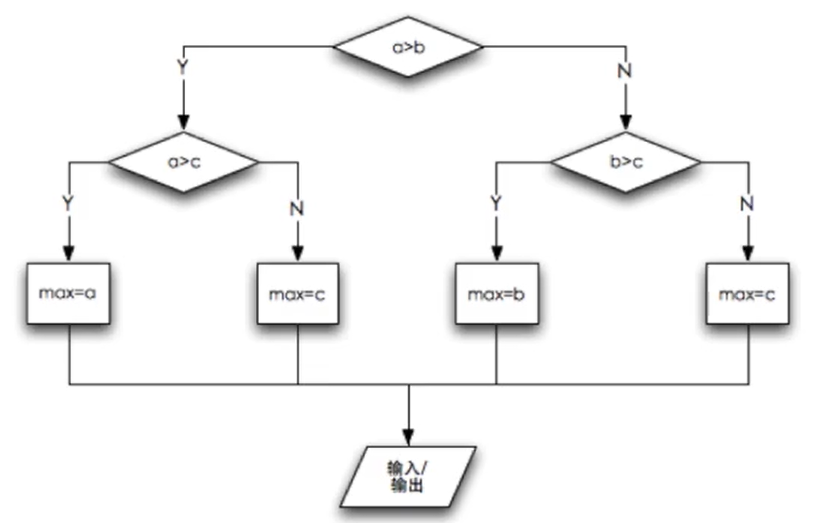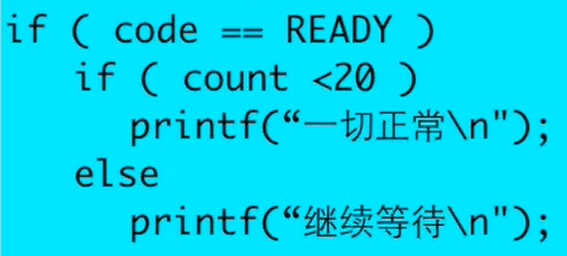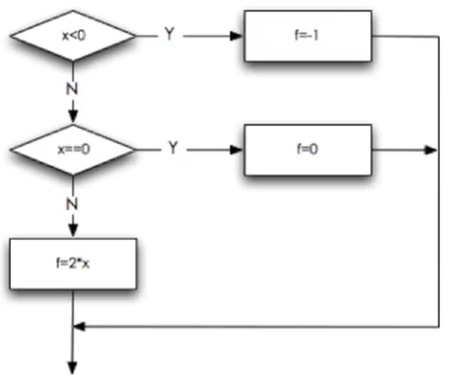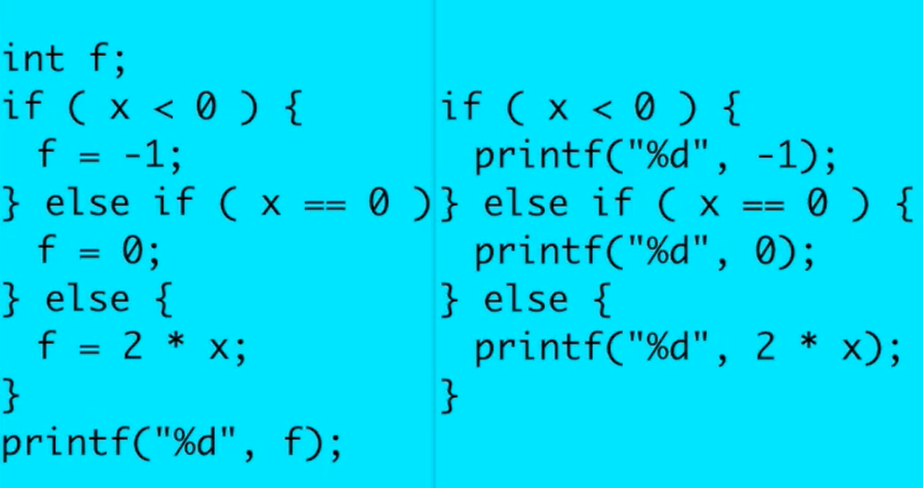嵌套的IF-ELSE
判断三个数字的大小

#include <stdio.h>
int main()
{
int a = 0,b = 0,c = 0;
scanf("%d,%d,%d",&a,&b,&c);
int max;
if (a > b){
if (a > c){
max = a;
}else{
max = b;
}
}else{
if (b > c){
max = b;
}else{
max = c;
}
}
printf("max=%d",max);
}1512,4751,995
max=4751
--------------------------------
Process exited after 10.74 seconds with return value 8::: tip if、else后面的大括号中只有一句话时可以省略大括号 ::: 省略括号后的程序如下:
#include <stdio.h>
int main()
{
int a = 0,b = 0,c = 0;
scanf("%d,%d,%d",&a,&b,&c);
int max;
if (a > b)
if (a > c)
max = a;
else
max = b;
else
if (b > c)
max = b;
else
max = c;
printf("max=%d",max);
}嵌套的判断
当if的条件满足或者不满足时,要执行的语句也可以是if或if-else语句,称为嵌套的if语句。
else的匹配
else总是和最近的那个if匹配。
#include <stdio.h>
int main()
{
const int count = 20;
int a = 0,b = 0;
scanf("%d,%d",&a,&b);
if (a == b)
if (a < count)
printf("good");
else
printf("bad");
return 0;
}(1)当a和b相等并大于count时,程序跳到12:
26,26
bad
--------------------------------
Process exited after 5.431 seconds with return value 0(2)当a和b相等并小于count时,程序执行10:
16,16
good
--------------------------------
Process exited after 6.571 seconds with return value 0(3)当a和b不相等时,程序跳到13:
16,26
--------------------------------
Process exited after 3.551 seconds with return value 0使用大括号可以改变if和else的配对关系
#include <stdio.h>
int main()
{
const int count = 20;
int a = 0,b = 0;
scanf("%d,%d",&a,&b);
if (a == b){
if (a < count)
printf("good");
}else
printf("bad");
return 0;
}(1)当a和b相等并大于count时,程序跳到13:
26,26
--------------------------------
Process exited after 3.419 seconds with return value 0(2)当a和b相等并小于count时,程序执行10:
15,15
good
--------------------------------
Process exited after 2.986 seconds with return value 0(3)当a和b不相等时,程序跳到12:
15,26
bad
--------------------------------
Process exited after 4.109 seconds with return value 0对于上述加了括号的if-else程序来说,括号内的的if语句没有对应的else语句,else语句和大括号前的if语句组合。
缩进
缩进格式不能暗示else的匹配
#include <stdio.h>
int main()
{
const int count = 20;
int a = 0,b = 0;
scanf("%d,%d",&a,&b);
if (a == b)
if (a < count)
printf("good");
else
printf("bad");
return 0;
}(1)当a和b相等并大于count时,程序执行12:
26,26
bad
--------------------------------
Process exited after 2.298 seconds with return value 0(2)当a和b不相等时,程序跳到13:
26,16
--------------------------------
Process exited after 3.258 seconds with return value 0::: tip 上述实验证明格式的缩进不会影响else和if的匹配,else还是会首先和最近的if匹配,如果需要改变匹配关系,需要使用大括号。 ::: ::: warning 为了避免不必要的麻烦和误解,在if和else后加上大括号,作为良好的编程习惯。 :::
级联的IF-ELSE IF
分段函数的if-else写法 表示f(x)={-1,x<0;0,x=0;2x,x>0}
#include <stdio.h>
int main()
{
int x = 0,f = 0;
scanf("%d",&x);
if (x < 0){
f = -1;
}else{
if(x == 0){
f = 0;
}else{
f = 2 * x;
}
}
printf("%d",f);
return 0;
}::: tip else后接if,可以连写在一起“else if” ::: 将上述程序的9、10行的else、if语句改写:
#include <stdio.h>
int main()
{
int x = 0,f = 0;
scanf("%d",&x);
if (x < 0){
f = -1;
}else if(x == 0){
f = 0;
}else{
f = 2 * x;
}
printf("%d",f);
return 0;
} 上述流程图,构成了如下级联的if-else:
上述流程图,构成了如下级联的if-else:
if(exp1)
st1;
else if(exp2)
st2;
else
st3;程序的最前面和最后面有一个匹配的if和else,中间部分写成else if,在程序中,所有的else都对齐,在条件很多时可以节省屏幕空间,便于阅读。
上述改写过的程序还有一种表达方式,省略变量f,在每一个条件后输出结果,如下:

左边的程序优势更明显(单一出口),变量f的使用和程序执行过程无关,后续变量f可以用于其他运算,右边的程序每一步判断后直接输出结果,后续无法参与其他计算。

